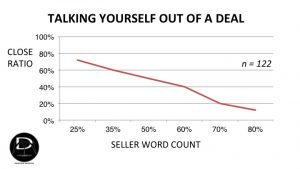When you can get a prospect or a client to open up to you, sharing personal stories and revealing their perspectives, it’s a gold mine of knowledge that can propel your relationship forward. But too often, they merely give you headlines at best, focusing instead on your price, your product and what you can do for them.
That’s why we overemphasize prepping content for meetings, loading up on bloated power point presentations and stories we can share. In our research at Deeper Media, we’ve found that it’s easy for you to ‘talk your way out of deal’ by monopolizing conversations. In this graphic, you’ll see that the more of the conversation you take up – the lower your closing ratio.

The key to getting prospects and clients to open up to you is to prepare a few provocative questions and then be prepared to extend their answers into meaningful reveals. You can ask historical questions (“Tell me about a time when _____” or “How did ______ come to be?”) or creativity questions (“What is your vision for _____?” or “What would you build if budget was no object?”) to get the ball rolling.
You’ll likely get pretty crisp responses, so you’ll need to be on the ready to leverage what Ask More author Frank Senso refers to as “questions without question marks.” Here’s how it works: Someone tells you about a situation they had in broad strokes and you lean in and say “go on!” This usually elicits more detail and color from them. Another way to do this is to remark, “fascinating, tell me more” or “I’m tracking with you, continue.”
You can also simply grunt affirmatively as you nod your head and resist the urge to interject. If you will use these statements and show patience, your conversational partners will open up to you. If you butt in, saying, “hey, that happened to me,” that kills their storytelling process. If you cut them off to transition to your company, product or service, you’ll never get them back to story sharing.
In many situations, your technique and patience will enable your conversational partners to learn something about themselves, their unstated beliefs and attitudes and what really drives them. Up until the rich conversation with you, he or she may never have had a chance to really talk-it-out fully.
As nonprofit fundraising guru Karen Osborn said in Ask More: “People forget what they heard, but they remember almost everything they say.”
Take a few minutes to watch this excerpt on listening skills from one of my recent keynotes:
Tim Sanders, CEO of Deeper Media Inc and best-selling author of Dealstorming: The Secret Weapon that Will Solve Your Toughest Challenges.


